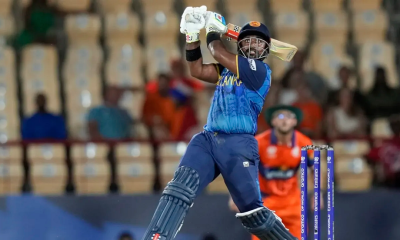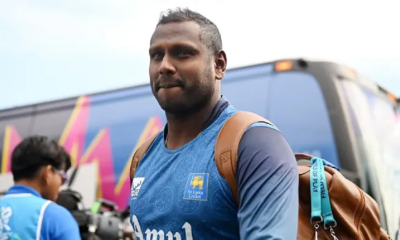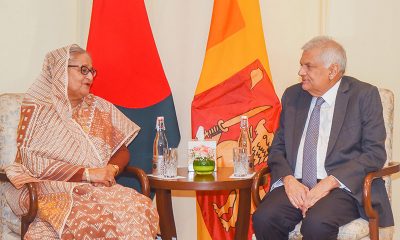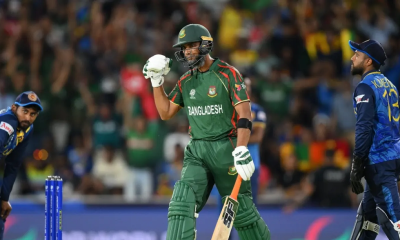Opinion
Giving the Fuller Picture on Nuclear Energy
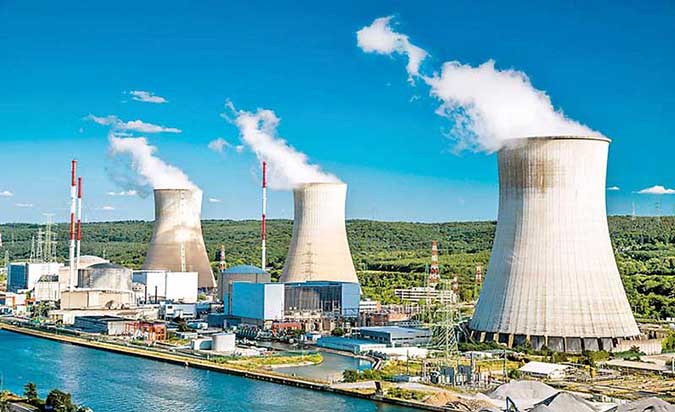
(Correcting some Misconceptions)
In the Sunday Island of Apr. 21 a letter from Dr. U. Pethiyagoda said it is worth emphasizing that uranium was first developed as a nuclear fuel to use in reactors not because of its safety features or that it was ecologically harmless, but that it could be used to make large bombs befitting the world’s great superpower.
And now we find that uranium also can be used to make “depleted uranium” a very hard, heavy metal useful in munitions for war. They deliberately side-lined thorium, a less dangerous, more ecologically friendly metal, and chose to develop and use uranium due to those benefits of war. The use of thorium to generate power is an astonishing omission on Dr. Pethiyagoda’s part. Thorium has very valuable qualities.
Crucially, energy from thorium is a safer, cleaner, simpler process if you use the liquid fluoride thorium (LIFTR) process. And because this process is scaleable, the reactors can be made large or smaller and these are cheaper to build than uranium power generation. This lower cost brings them within the reach of smaller countries. In fact many of the points Dr. P raises of the harmfulness of uranium, do not apply to thorium reactors, because the heat generation process is different and safety features are built in to the reactor vessel as part of the fuel cycle.
Please note that several countries are researching the uses of thorium for power generation, notably Russia, India and China. These countries have designed, built and are operating thorium research reactors. These are mostly in the experimental stage as the possible permutations and combinations of inputs are many and various. These may not be optimized to easy solutions. However, these countries are employing thousands of scientists doing research to find best solutions.
The aim is to generate heat from thorium safely and economically. The pundits expressing their views in the Sunday Times condemn nuclear power but have omitted this important information. It can be confidently asserted that the advantages arising from the use of thorium are so great that the difficulties will be overcome, eventually.
This will benefit mankind immensely – machines based on thorium energy will give continuous power for many years with only minimal environmental damage. While the great list of problems listed apply to uranium power generation, they may not apply to energy from thorium.
However, there are two problems with thorium – these are: 1) The lack of qualified, trained staff to operate these machines and 2) The lack of regulatory approval. The point (2) given above may contribute more to the cost than the whole installation itself which gives the familiar and well established uranium plant an advantage. Potential owners of such plants may prefer uranium power over thorium as a means of reducing uncertainties – that is uranium’s chief asset.
By reminding us of the horrible mistakes and accidents of the past, this throws up a wall of horror and revulsion at all things nuclear, which makes the greens and coal lobbies happy! In fact, the thorium reactor using the Liquid Fluoride Thermal Reactor (LIFTR) process is a remarkably safe method of generating heat and energy. This is because there are safety measure actually built in to the machine which ensure a run-away can never occur. Thorium is the opposite to uranium: in the case of thorium, the process has to be coaxed along to keep it going.
Because of their relatively small size and cost, efforts of containment are manageable. There are huge pluses, or selling points for thorium that the writers of these letters fail to discuss. Power installations can be quite small, even house-sized buildings, say locating one either side of a town or city. Importing thorium pellets is not necessary as Sri Lanka has its own deposits of Thorium. Also note that by placing units where the power is needed obviates the necessity for transmission lines connecting a countrywide grid. This is a huge savings in capital costs and power transmission line efficiency losses.
The costs of building smaller power installations is well-within the Sri Lankan budget and also would create many interesting, scientific jobs. Therefore, I write to point out that these letters do not give the entire picture of generating energy from nuclear sources. But they do help to build resistance to the truth, new facts and new technologies.
It can be noted that if Russia is contracted to build such installations, they would guarantee their work and give conditions and caveats. (They have vast amounts of experience from many such installations around the world). On that basis it would be most unwise to refuse their high quality offer.
Priyantha Hettige
Opinion
A paradox of history

There seems to be a striking similarity between ancient Greece and modern Britain. Both countries remain paradoxes of history. Greece was a small city state constantly at war with neighbouring countries. It did not have a big army, but it had considerable sea power. However, Greece was a leading state over the whole of the Mediterranean. In fact, Greece was once a super power in the Western world.
Britain was very powerful in the 19th century. British justice was administered in Africa, India and Ceylon. British factories flourished in many countries and schoolchildren started reading R.L. Stevenson’s ‘Treasure Island’ and the works of Rudyard Kipling. What Ralph Waldo Emerson said in the 1850s is still valid today. He said, “If there’s one test of national genius universally accepted, it is success; and if there be one successful country in the universe for the last millennium, that country is England. It is the best of actual nations.”
In World War I, Britain faced a crushing defeat. Eventually, the British Empire was reduced to a Commonwealth. World War II shattered the image of Britain further. Although Britain lost much of its power, it continued to be an influential country. Even after achieving independence, India retained English as an official language. The British parliament system is well established in many Commonwealth countries. Some people still wonder how England still exercises its influence over the minds of men and women.
Staying power
There are many powerful countries in the world today such as the United States, Russia and China. Although England is not a super power, she has staying power. According to Oliver Wendell Holmes, a good part of greatness is simply being there. For that matter, England has been there for many centuries. So far no other country has been able to defeat her. As a result, sometimes we wonder whether we can have a world without England.
England has had an unwritten Constitution for a very long time. Other countries have emulated her political institutions. The British people have an established church with complete religious freedom. Although there are social classes in Britain, there has been no major clash among them. Unlike in many other countries, there are only two leading political parties in England. When the Labour Party is in power, the government is not subservient to labour. Similarly, when the Conservative Party is in power, the government is not conservative.
Most British colonies in the East including India and Ceylon did not sever the cultural and emotional links with Britain and retain them even after achieving independence. India became independent in 1947, but she decided to retain English as an official language. By doing so, India produced a number of English writers such as R.K Narayan. However, Ceylon did not give English any official status and treated it as a link language. As a result, students paid less attention to learning English. They were made to understand that everything can be done by learning Sinhala and Tamil. We have failed to produce English writers in the calibre of J. Vijayatunga who wrote ‘Grass for my feet.’
Politically shrinking
The United Kingdom is politically shrinking. However, its influence vibrates throughout the world. English has brought many nations together. There is a common understanding among countries that share the English language and literature. William Shakespeare’s dramas are staged in countries such as China where English is not an official language. People have come to the conclusion that English has become a broker of ideas and institutions.
England is not an aggressive country. However, if provoked, it can deliver a mortal blow to its enemy. British Prime Minister Margaret Thatcher showed her mettle as the iron lady. Britain held the fort against the might of Napoleon Bonaparte who ruled France. The country can still boast of a heavy moral credit. The British stick to their international agreements. The power of England draws mainly from its language. British people say ‘It’s right’ when it is right’. When it is not right, they say, ‘It’s not right.’ Meanwhile English occupies a pre-eminent place in world languages. All the research work in many parts of the world is available in English. You can learn any subject easily through English.
Apart from the language, people respect British standards which are technical specifications and quality benchmarks developed by the British Standards Institution. The United Kingdom’s independent national standards body was established in 1901. It maintains over 37,000 standards covering industries such as construction, manufacturing and technology ensuring safety and reliability.
British English
Standard British English is the variety of English that has undergone codification to the point of being socially perceived as the standard language associated with formal schooling, language assessment and official print publications. For historical reasons dating back to the rise of London in the ninth century, the form of language spoken in London and the East Midlands became the Standard English used in schools, universities, literature and law.
British English functions as one of the two major foundational and standard varieties of the English language alongside American English. It serves as a primary reference point for spelling and grammar. It acts as a global standard, and international institutions are often defined by specific pronunciation.
Most Sri Lankan doctors primarily move to England for postgraduate training, higher specialisation and better career prospects. They are driven by superior training infrastructure, world-class facilities and globally recognised qualifications.
To sum up, when you think of learning an international language, there is no alternative to English. If you wish to read literature, you cannot ignore eminent English dramatists and poets such as William Shakespeare and John Milton. Many leading Sri Lankans like S.W.R.D. Bandaranaike were Oxford University products. Therefore, English deserves to be made an official language in Sri Lanka.
By R.S. Karunaratne
Opinion
State Literary Awards only for the rich?
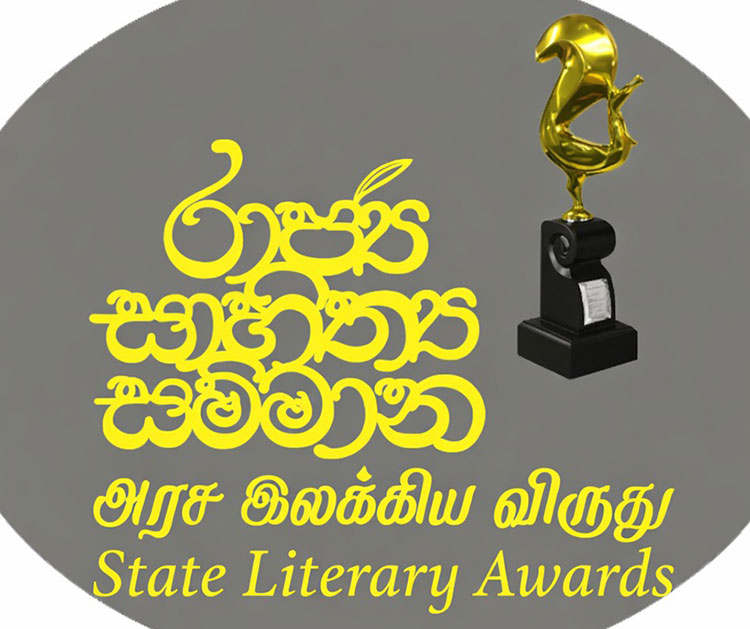
The Department of Cultural Affairs has once again called authors, and publishers to lodge their entries for selection of the prestigious State Literary Awards 2026.The criteria and conditions required and notified in the public domain, makes it mandatory for the literary work to be printed and published prior to submission for consideration of the awards. There is absolutely no provision for writers to submit their work in Manuscript form.
Where does that leave the financially impoverished writers who are talented, creative and wish to submit a well edited typescript of their work as manuscript for consideration of the State Literary Awards? In a literary environment that encourages a proliferation of self-published books of all forms and features presented by vanity publishers who have their eye on the purse of the author than on literary merit and artistic excellence, it is easy to show that you are an ” established writer” by spending your cash abundantly towards glossy covered books which the printing industry and fawning publishers will lap up with greed.
Even the Gratiaen Prize in Sri Lanka, sponsored by world-renowned Michael Ondaatje allows for Manuscript entries together with published books. Significantly, the manuscript entries that win the prize are assisted to publish their work which is part of the winnings. Many a young, aspiring writer with little funds who won the Gratiaen Prize on merit, but had submitted their entry in manuscript form have been thereby encouraged to submit their work on merit basis only.
It is a fact that the Commonwealth Short Story Prize, a massive state-supported initiative across 56 nations accepts only unpublished short fiction. Further, several countries in the world have established national or state level literary prizes that specifically accept unpublished manuscripts to provide equity in discovering new talent and supporting national literature without bias or favour. In Australia, Jamaica, Philippines, major national awards organised by the State for literature, specifically accept unpublished manuscripts for consideration.
Let’s face the truth. The printing costs are escalating. There is little demand in Sri Lanka for literary work in the English Language in particular. Traditional Publishing where the literary work is reviewed and assessed for talent and creativity and thereafter published is seldom found. The reviews and critical analysis of literary works are rare. But publishers make a pile by pandering to the vanity of aspiring writers who have the financial clout to pay their way through to being featured in prestigious award ceremonies and accolades. Thereafter, their substandard works get a further fillip by bearing the label of “Won the State Literary Award for Literature”! It is a cycle of literary charlatans and their pimps in the publishing industry for whom the price that is paid for publishing and not Meritocracy is the sine-qua-non.
Is this the level playing field promised by the NPP Government and their Marxist protagonists? A government that was voted into power on the platform of affording fair opportunity and equality seems to discriminate in favour of the Haves against the Have- nots in the cultural department to say the least! Anil Fernando
Opinion
Delivering on English

English literature offers a rich heritage of wonderful ideas and thoughts. The reader can be intellectually uplifted. It brings refreshing new vistas and stimulating new ideas. However, this English literature has to be first introduced to the student in order to fire up his or her interest and be made aware of this rich source of culture. Students of basic English as a second language work hard and learn all the hum-drum mechanics of the language, for which they get tested and graded. But importantly, nae crucially, this should be followed up with intellectual rewards for the students’ efforts – which, of course, is the enjoyment of the works of literature of the many great writers in the English language. This is the great payoff, the great dividend for all their efforts but this, apparently goes missing.
One of the obvious reasons for the lack of “follow through” may be lack of time allocated in the curriculum – or, perhaps, more darkly, the teachers’ own lack of knowledge of the great range of good reading materials produced by the countless generations of literary geniuses who have gone before. Such writers have laid down for us a heritage of glorious literary works in books and essays, all of which are to be found in any good library. It is thought that much of this good literature ought to be introduced to all students of English, “full stop,” as part of developing a knowledgeable and cultured society. (Isn’t that what we want?) Reading English literature should bring an intellectual enrichment to all those willing to drink from this Bacchanalian horn of plenty.
It must be said finally, that it can be fairly expected that most young people, especially those learning English as a second language, are totally unaware of the many outstanding pieces of writing that propel English to stand tall amongst the rest. That is, students need to be first introduced to great writings and have a spark of interest ignited in these great works of literature.
For example, by being introduced to “Daffodils,” a short descriptive poem by William Wordsworth, the student can get some very pleasant ideas to think on.
Do not overlook Conan Doyle’s “Sherlock Holmes” detective stories, each one captivating the reader’s attention right to the end. It is by these short stories that the novice reader can first consolidate his power of reading.
For light reading Jerome K. Jerome’s book “Three Men in a Boat” is suggested. On one occasion he goes to the library suffering from a slight hay-fever (allergy) seeking a cure. He consults a book, “Lexicon of Pharmacology”, and recoils in horror as his symptoms fit most of those diseases described in the book! He concludes he cannot live much longer and staggers home to rest and recuperate! This is a well related tale in the book – although seemingly quite implausible!
Similarly, by having the poem meanings explained, e.g. “What is Life if Full of Care?” by William Henry Davis – how he regrets that we humans are always in a hurry, too busy to notice or see the delights of nature, and scenes of natural beauty, e.g., a young woman’s smile as she passes by; we have no time to make friends and even kiss her. Regrets! Explaining this to students would bring a certain intellectual insight.
John Keats’s poem, “Ode to Autumn” is another great work describing the ripening fruits of the autumn season and how nature as a living being, brings to fruition all the good things of a rural landscape quietly humming with warmth after a hot summer.
Again, it is likely necessary to explain to a young, Sri Lankan mind the meaning of the descriptive poetry found in this magnificent poem.
This is the real English to be tasted and then swigged at lustily in pleasure and satisfaction, not some writing airing historical grievances for children to study!
1970 British Cohort Study
It should be observed here that the ‘1970 British Cohort Study’ followed 70,000 people to examine various aspects of their lives. One result discovered was that if a young person reads a lot, it develops his/ her general intelligence no-matter his parents; it makes him smarter.
It was also noted that reading brings life-long benefits; it improves mood, it helps with social skills, increases empathy, reduces anxiety, protects against depression and slows brain decay, the study found.
But these days many young people never gain a great competence in reading English; the fear is that standards are falling. This is bringing poorer critical thinking, less depth of personality and less empathy for others which has the result of a more turbulent society.
People are urged to switch off their headphones and read more of what they like – try reading the newspapers!
Priyantha Hettige
-

 Life style2 days ago
Life style2 days agoMarriot new GM Suranga
-

 Midweek Review6 days ago
Midweek Review6 days agoA question of national pride
-

 Features2 days ago
Features2 days agoMonks’ march, in America and Sri Lanka
-

 Business6 days ago
Business6 days agoAutodoc 360 relocates to reinforce commitment to premium auto care
-

 Opinion5 days ago
Opinion5 days agoWill computers ever be intelligent?
-

 Features2 days ago
Features2 days agoThe Rise of Takaichi
-

 Features2 days ago
Features2 days agoWetlands of Sri Lanka:
-

 Business16 hours ago
Business16 hours agoMinistry of Brands to launch Sri Lanka’s first off-price retail destination


